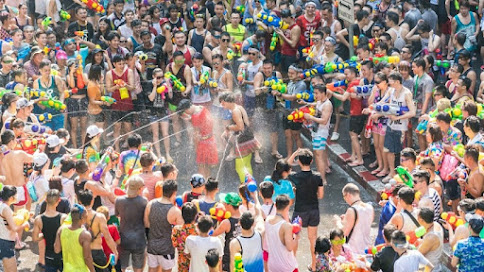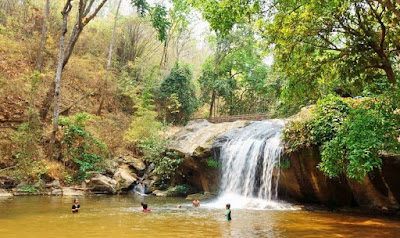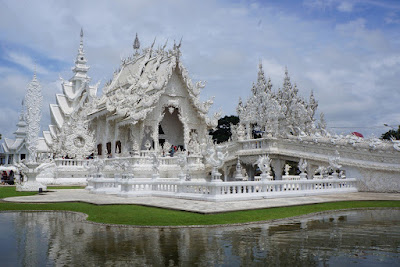Marigolds in full bloom with Saint Joseph Mae Chaem School in the background.
Lost in time, the isolated northern valley of Mae Chaem is the perfect escape from the stresses of urban life.
The deer and bird dance celebrates the Chula Krathin ceremony in Mae Chaem.
A long and winding road leads from the eastern side of Inthanon Mountain
to the western side and the distance has kept Mae Chaem hidden for
centuries. Part of
Chiang Mai
Province, which welcomes hundreds of thousands of tourists every year,
Mae Chaem feels like a lost hinterland tucked deep in a valley beyond
the high Thanon Thong Chai range.
Folks in the deep valley have Inthanon Mountain - at 2,565 metres,
Thailand's highest - to thank or perhaps blame for the slow evolution of
progress.
"Every morning small bands of monks, novices and children walk across
the rice paddy fields to collect alms," says Pop, a travel journalist
who relocated to Mae Chaem five years ago.
"The temple kids strike the gong to alert the villagers that the monks
are heading to their homes, so they had better prepare their alms. You
hardly see this outside Mae Chaem."
Mae Chaem during the rice harvest.
It is possible to reach Mae Chaem by following the road from Hot
district but this takes a lot longer than the four-hour drive over the
hills and isn't nearly as pleasurable.
But whichever way you go, Mae Chaem is an ideal place to escape the city.
"When I opened a bakery here five years back, the locals were very surprised," says the travel writer turned baker.
"There had never been a bakery in the town and residents wanting a
sugary treat would have to wait for deliveries, often stale, from
Chiang Mai.
"The story of my moist chocolate cake has travelled way beyond my bakery to the district's most remote villages."
A mural at the temple of Wat Pa Daed portrays the tale of the Lord Buddha and the story of Mae Chaem itself.
We come to Mae Chaem in mid November, though we have to tell Pop that we
are not here for his chocolate cake, yummy though it is.
Winter is approaching and the air is already cold. The hidden valley is
taking a short break from rice harvesting to mark Chula Krathin - a
ceremony that celebrates the end of the three-month Buddhist retreat.
Here in Mae Chaem Buddhists traditionally offer the yellow robes to the
monks to complete Vassa.
Residents of all ages gather at Wat Baan Tap on the eve of the
ceremony, which is a big social event for this small valley. Earlier in
the day, they will have gathered the cotton bolls from the plants and
spun these into yarn. Now they are busy weaving and dyeing the yellow
robe. Lanna folk singers take it in turns to entertain.
VIDEO
"Chula Krathin is a small and humble rite that demands big faith in
Buddhism," says grandmother Chan, her hands and feet busy behind the
spinning wheel. "The yellow robe, from gathering the cotton to the
weaving and dyeing - must be completed within one day."
In Mae Chaem, making a yellow robe within a day is not a problem as
everyone grows up with loom and spindle. The district is noted for - and
has made a fortune from - its cotton sarongs boasting a unique pattern
around the hem. The pha sin tin chok of Mae Chaem are the pride of the
valley.
"This pha sin is about 50 years old," says Granny Kaew, her lips firmly
gripping a home-made pipe, as she shows me her cotton sarong. "It was
handed down from my mother, and I will pass it to my grandchild."
Mahatama Gandhi, I conclude, was right: if everyone in the world spun an hour a day there would be no more wars.
The valley is quiet, pristine and peaceful.
Source: The Nation
.
.












































